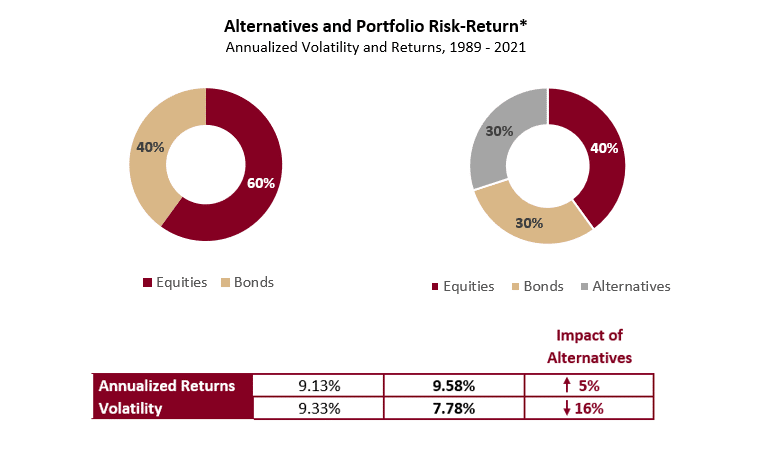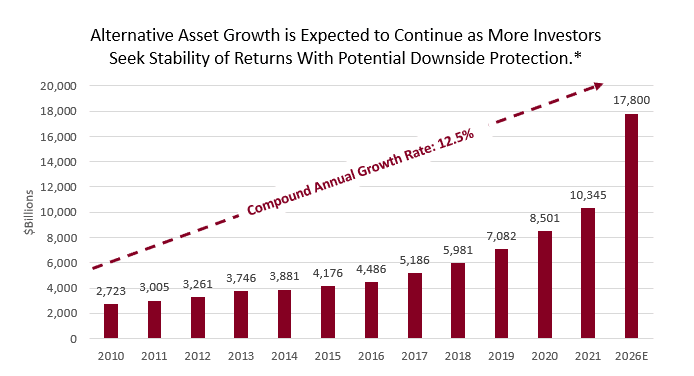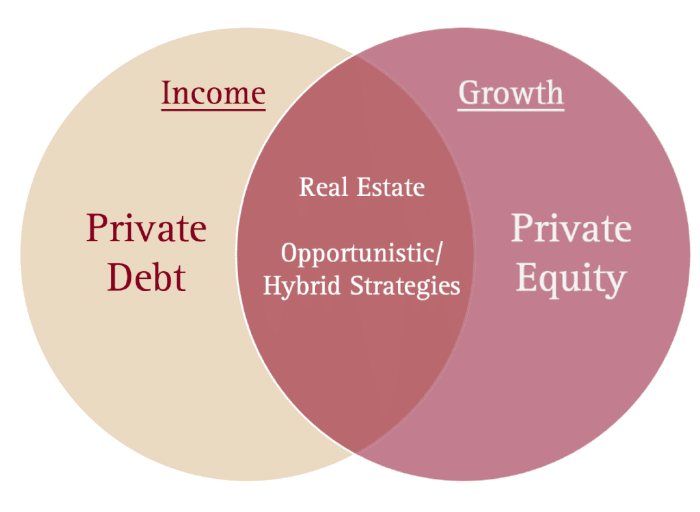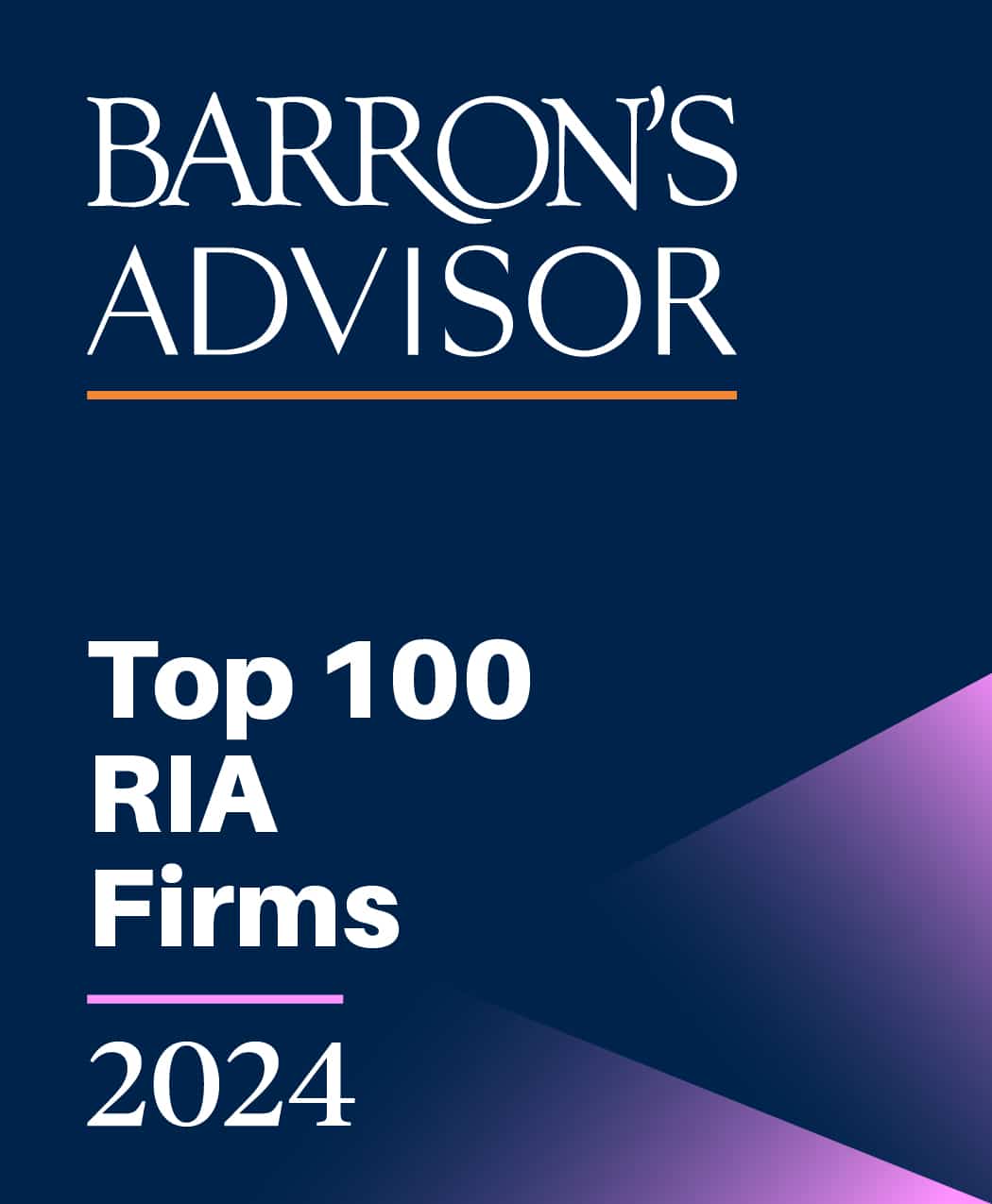Private Alternatives
Over 30 Years of Sourcing, Evaluating, and Monitoring Private Alternative Investments for Your Portfolio
Higher inflation rates. Economic uncertainty. Global instability. These are unprecedented times for investors. As movement in bond yields and high stock market volatility challenge traditional portfolios, investors are looking to diversify. They seek innovative solutions that offer the potential for higher growth, higher yields, stronger absolute returns and less volatility. They understand that this comes with the tradeoff of having less liquidity than traditional stocks and bonds.
Private alternatives, or ‘alts,’ have been a key part of Homrich Berg’s investment philosophy for over 30 years, and we believe they are as relevant today as they have ever been. We started investing in private alternatives outside of traditional stocks and bonds back in the early 1990s and have grown to be one of the leading independent fiduciary RIAs focused on these investments. Since then, HB has continued to grow in this space with $2 billion+ in assets under management (as of 12/31/2024) invested for clients in private alternatives.
Our Chief Investment Officer, Stephanie Lang, CFA is the leader of the Atlanta Institutional Investor group, a collection of major institutional investors focused on the private alternative space. She manages a dedicated team of analysts who are responsible for sourcing, evaluating, and monitoring private investments. She also oversees Homrich Berg’s sourcing, due diligence, and manager selection for private alternative asset classes and is a frequent commentator on the topic.

*Past performance is not indicative of future results. Sources: Blue Owl Capital, Bloomberg, Burgiss, HRFI, NCREIF Standard & Poor’s, FactSet, J.P. Morgan Asset Management. Alts include hedge funds, real estate, and private equity, with each receiving an equal weight. Portfolios are rebalanced at the start of the year. As of May 31, 2022.
You May Be Asking, What Are Private Alts?
Simply put, we define alternatives broadly as opportunities that are not publicly traded on an exchange. While public managers own the equity (stocks) and debt (bonds) of public companies, an entire universe of managers within alternatives do this with private companies and assets.
As such, private alternative investments provide investors opportunities that might not be readily accessible via the public markets. In addition, since private alternatives can be less correlated to traditional asset classes, they can have greater diversification potential in the context of a total portfolio. They are typically not as liquid as public investments, so investors have to recognize that tradeoff.
Private alternative investments can include:
- Real Estate Investments
- Private Equity Funds
- Private Energy Funds
- Private Debt Funds
- Hedge Funds
- Venture Capital Funds
- Distressed Opportunity Funds

Why Private Alts Are Expanding
A number of trends are contributing to the growth of private alts investment opportunities.

*Past performance is not indicative of future results.
Sources: Blue Owl Capital and Preqin. Data as of November 2021.
The magnitude of rising individual investor allocations toward alternatives supports our desire at Homrich Berg to expand our clients’ access to private market investments.
Why Invest in Private Alts
While private investments can be riskier on a stand-alone basis, investors can be rewarded for this risk with higher returns to capture an “illiquidity premium.”
Lang believes alternatives have the potential to reduce volatility within a portfolio because the fundamentals of many private assets, such as private companies or real estate properties, “might not be highly impacted by the day-to-day changes in public markets.”
Because of how private funds are generally structured, he explains, investors can take a longer-term approach to maximizing asset value, “particularly with private equity and private real estate,” says Lang. “Private market investments tend to be active, buy-and-hold strategies with a hands-on approach, whereas public markets can be highly influenced by shorter-term events. For example, a public company that fails to hit its quarterly projections may see its stock drop.”
What to Consider Before Investing
Considerations of investing in Private Alts
Illiquidity
Compared to publicly traded assets, private alternatives may be locked up for much longer (can be 10+ years).
Fees & Taxes
Private alternatives generally have higher fees than public investments. Private investments often require a personal tax extension and may require additional state filings.
Valuations
Since private investments are not publicly traded, it can be difficult to value them. Because of the complexity of gathering data, valuations are often lagged.
Control/Influence
As most private alternatives are illiquid, investment managers have greater control over the investment.
Manager Selection
While liquidity is an important factor, so is manager selection. “In public markets, we believe the dispersion of returns among managers with the same intended strategy or benchmark won’t be significant,” says Lang. “However, in private markets, your returns can vary considerably, because the dispersion might be substantial between top-quartile and bottom-quartile managers.” Investments should only be made with institutional managers who have appropriate guardrails in place via their legal documentation. Also, firms that offer alternatives to their clients should have dedicated resources to sourcing and performing due diligence on alternatives managers, as “private alts are so nuanced and different from public market offerings,” she adds.
Sourcing and Due Diligence
Firms must also know how to source opportunities. “Several thousand private funds are in the market at any given time, so the top of the funnel is very wide,” says Lang. “Additionally, it’s quite challenging to whittle down the vast universe of managers to whoever you think will perform best within an asset class going forward.” Because it’s so time-consuming and resource-intensive, Homrich Berg dedicates significant resources to researching and analyzing this area of the market precisely.
Investment Minimums
Scale also matters. Some private alts managers might require minimum investments of $5 to $10 million. Because Homrich Berg has accumulated years of relevant experience and manages over $18 billion in assets, it can access multiple avenues to reach higher minimums and become more meaningful to managers. “We create funds-of-funds for clients, which allows us to make one larger commitment to managers by aggregating capital from many clients. We also provide the opportunity for larger clients to simply invest direct in their own personal mix of individual funds that we have approved.”
Are Private Alts Right for Your Portfolio?
Homrich Berg and Private Alts
More accessible than ever, nontraditional investments such as private alts are becoming popular among individual investors as seen in the data mentioned earlier.
That’s because these investment solutions may enable clients to address their capital-appreciation and income objectives while enjoying a measure of protection against inflation. A complement to traditional equity and fixed-income investments, private alts can also help improve diversification, increase return potential, and manage the volatility. Not all private alternatives achieve those goals, so careful selection is important and all risks must be well understood before investing.
Still, some believe alternative investments are available only to institutional investors or a select set of ultra-high-net-worth clients. At Homrich Berg, however, we seek out a range of opportunities to help our clients achieve their investment goals and consider private alts as a fundamental part of most client portfolios.
For over three decades, we have been building our alts platform which comprises of access to a wide range of institutional brand-name firms as well as smaller niche players, including funds on the platforms of other wealth managers.
“Alternative investments can provide many potential benefits to investors, with the ability to diversify away from public markets and the potential to increase investment returns over the long term.”
Our Alternatives Experience*
$2 Billion+
Current alternatives market value firm-wide
25+
Years investing in alternatives
30+
Alternative investment funds created for clients
100+
Active relationships with alternatives managers
*Data as of December 31, 2024
10
Person dedicated investment research team
9
Investment team members with CFA charters or are candidates in the CFA program
Because we are a fiduciary independent firm, our clients know that our recommended investments are not driven by a motivation to “sell” a specific investment based on financial incentives.
We are never financially incentivized to recommend one investment over another, so our sole focus is to invest with managers we believe have the greatest potential to generate the best risk-adjusted returns for our clients.
For those who might not meet the minimums of some private funds, we assemble internal funds of funds, which are diversified portfolios of alternative strategies. HB also manages a multi-strategy hedge fund of funds (Peachtree Alternative Strategies) for clients where the inclusion of a more “absolute return” targeted type of strategy makes sense in their diversified portfolio. HB clients do not pay extra for these funds and HB has no financial incentive for clients to invest in them. We’ve created 30+ prior fund of funds investment vehicles since 2000 with 100+ manager relationships inside those funds.
How We Implement Alternatives
Homrich Berg creates and offers specific funds focused on private debt, real estate and private equity

Homrich Berg Provides Access to Private Alternatives Directly or Through Internally Managed Funds
Private Market Opportunities
Private alternative funds offer diversification from traditional public funds and provide potential to outperform
Access Vehicles
Homrich Berg funds give investors access to private investments they otherwise may not be able to access
Diversification Benefits
Homrich Berg funds are diversified across strategies and managers
Fee Structure
Homrich Berg does not charge a management fee or performance fees to investors
Rigorous Due Diligence
We perform rigorous due diligence on private investment opportunities
Experienced Team
Our firm has a dedicated investment research team supported by a senior-level investment committee
Track Record
Since 2000, our firm has created and invested in 30+ private fund of funds
Conclusion
With the potential for heightened public market volatility in both stocks and bonds, investors who are willing to take on some illiquidity risk with some of their assets should consider private alternatives as a potential source of yield, diversification, or capital appreciation—or a combination of all three.
Private alternatives have always been a tenet of Homrich Berg’s investment philosophy, and we believe they are as relevant today as they have ever been. It is important to work with a financial advisor to understand the pros and cons of alternative investments and how they might or might not be a good fit for your portfolio.
1https://www.wsj.com/articles/fewer-listed-companies-is-that-good-or-bad-for-stock-markets-1515100040
2,3https://www.ey.com/en_us/news/2021/11/ey-global-alternative-fund-survey Past performance is not a guarantee of future results.
4 https://www.preqin.com/insights/2022-preqin-global-alternatives-reports
Private investments are illiquid and are exposed to various risks, including, but not limited to, potential for complete loss of principal, liquidity constraints, and lack of transparency of the underlying investments, as more fully discussed in the private fund’s offering documents; investors cannot be assured that private fund investments will produce returns superior to those of the public markets; the fees associated with investing in private funds may be significant, and could potentially be layered; unlike liquid investments that a client/investor may maintain, private fund investments do not provide daily liquidity or pricing; investors are required to make certain representations regarding their financial qualifications for the purpose of determining whether the investor may invest and at what amount; private fund investments could complicate and potentially delay an investor’s ability to file taxes, and so should seek professional tax advice before investing in a private fund. This is not a solicitation, offer, or recommendation and some of the information has been sourced by a third-party. Please consult your Homrich Berg client service team to determine if private investments are suitable for your overall investment portfolio, and to determine the appropriate allocation to private alternative investments if used in the portfolio.

